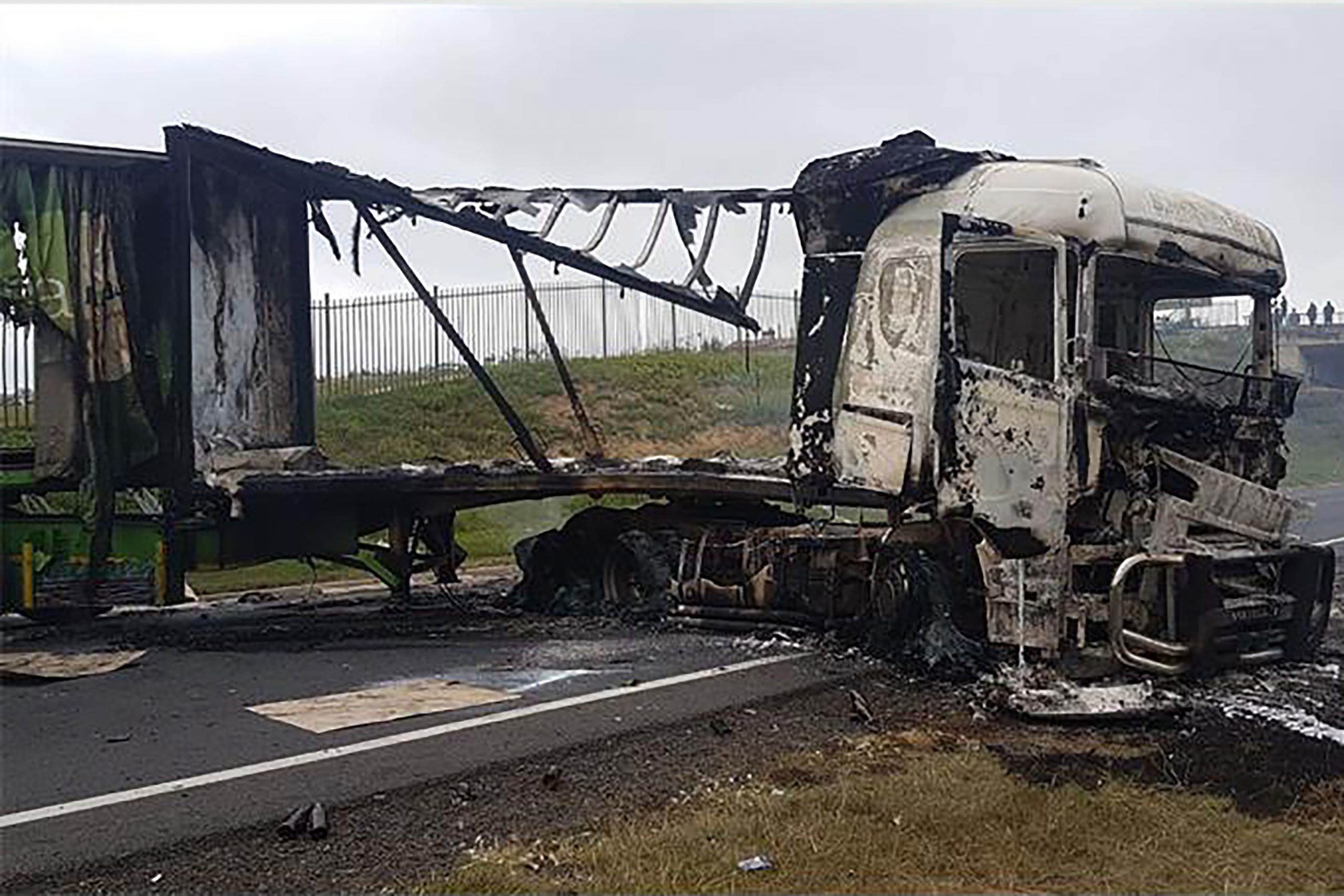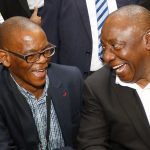Truck driver ‘war’ about more than migration
Attacks on truck drivers are more than xenophobia, they are part of a political project to further personal agendas and create new centres of power amid a breakdown in trust in the rule of law.
Author:
28 June 2019

The burnt remains of trucks now litter the roads of KwaZulu-Natal. As with other “xenophobic violence”, looking past the targets reveals something far more fundamental – and disturbing – about South African society.
This is not simply random or embittered violence at the hands of those denied the benefits of personal progress by the state or through capitalism. These attacks are a political project that uses resentment and bitterness to further personal and communal political agendas while creating new centres of power.
A form of often violent politics is emerging, in and outside of the ruling party and the state. It operates outside of the law and seeks to broker access to opportunities of various kinds – from jobs to land, tenders and state development – to build forms of authority outside of the laws that regulate the state and the market. In some instances, elected leaders and government officials are directly complicit in these increasingly militant attacks and the political project that drives them.
Related article:
First, the facts.
Since March 2018, at least 213 people have been killed, 1 400 trucks torched and R1.2 billion worth of goods lost, largely along the route between the port in Durban and Gauteng. The instigators say the trucking industry must stop hiring “foreign nationals” and are demanding that the authorities do something to ensure that “the right people” are employed.
The All Truck Drivers Foundation (ATDF), an organisation that represents truck drivers in South Africa, has warned that its “war” will continue “until all foreigners are gone”.
Members are planning a national shutdown on 18 July, which they are calling “Trucking Black Day”. With four out of five goods in Gauteng shipped along the route from Durban – which is also a supply line to Zimbabwe, Malawi and elsewhere – such actions threaten national and regional economies.
New targets
The ongoing violence suggests a shift in target. While the direct target of xenophobic violence has usually been international migrants, or outsiders in general, the current violence targets migrants and South African drivers indiscriminately. The South Africans who have been attacked are from elsewhere in the country or have shown inadequate loyalty to those wielding petrol bombs.
Attacking drivers is a form of political strong-arming designed to close the industry to all that those pushing the aforementioned political project label as outsiders. It is an open war, not only on truck drivers but also owners and the trucking industry as a whole. It is a dangerous development that warrants concern.
This is not an isolated development. For years, metered taxi drivers have attacked Uber drivers – sometimes imposing exclusive claims on access to key nodes in the transport network – and in some instances with apparent impunity. And groups such as the Delangokubona Business Forum have been using armed intimidation to gain access to private construction budgets.
These kinds of tactics are frequently mediated through claims about opportunities for “locals” that explicitly exclude migrants and people from different parts of South Africa. Now that the trucking industry is under attack, it does not seem unreasonable to wonder if similar threats will develop in other industries.
Feeble government efforts
Government efforts to counter assaults on those working in the trucking industry have been feeble. Some perpetrators have been arrested, but few have been prosecuted. Many of those arrested have been charged with a traffic offence and released on bail of R500.
Officials have condemned the violence but seem unprepared to take effective action against perpetrators. Minister of Police Bheki Cele has characterised the attacks on trucks as economic sabotage. This is true, but labelling them as such denies the immense social and political consequences of these attacks.
What is at stake extends well beyond debates relating to migration or protection for South Africa’s struggling workers in a time of mass structural unemployment and economic decline. It is disingenuous, and dangerous, to dismiss these as attacks on people who “shouldn’t be here anyway”. Making this about migration distracts us from what matters.
South Africa’s unemployment rate is officially over 27%. It is far higher in the places where violence typically occurs. But this violence is not about removing migrants, it is more generally about a dangerous politics of localism and entitlement, and rationing access to rights and opportunities: housing, healthcare, education, business opportunities, labour markets and the like. It is about the emergence of a politics of local strongmen in response to a general breakdown in trust in the rule of law.
Exclusion as ammunition
Government officials often act to placate such assertions and sentiments even while publicly condemning the violence they beget. Throughout the country, local political battles are being fought with exclusion as ammunition.
This was a repeated feature of contestation during recent election campaigns. Tacitly or explicitly endorsing exclusion can win votes or popularity for officials and institutions whose legitimacy is under threat. Promising to exclude people from another country, another party, another township or another province can bolster political careers for those who have little else to offer.
Whether driven from within or outside of the state, or an alliance of actors in and outside of the state, a politics of exclusion offers short-term political gains for a few while exacerbating the weakness of South Africa’s already fragile national economy. It reduces the prospects of constitutional protection and democratic forms of disputation for the many. Every victory creates further incentives for violent exclusion, a process that is seldom restricted to people who do not hold South African citizenship.
Related article:
Whether in Gugulethu, Ermelo or Durban, local residents regularly exclude people deemed to be “outsiders” regardless of their citizenship. Whether it is jobs, houses, municipal services or living spaces, people are denied rights on the grounds of where they are from, even when that is elsewhere in South Africa. This fragments the economy and limits the benefits of trade and domestic mobility. It is also an expression of an ongoing attack on democratic values.
Just as we debate the ethics of vigilante violence – of which these attacks on truck drivers are a particular offshoot – we must ask who we want rationing the rights to jobs, business and housing. Closing the borders to Zimbabwe and Mozambique may look to some like the country asserting its independence, but such reactionary moves will not sustain or promote South African jobs or business.
For now, that is beside the point. The impulse to exclude threatens to draw boundaries and divides at every level across the country. South Africans rightfully worry about the lingering effects of racism and the economic marginalisation of previously oppressed groups. Yet in ensuring that everyone has equal access to the country’s scarce but adequate resources, whose interests are served by South Africans violently excluding each other?


